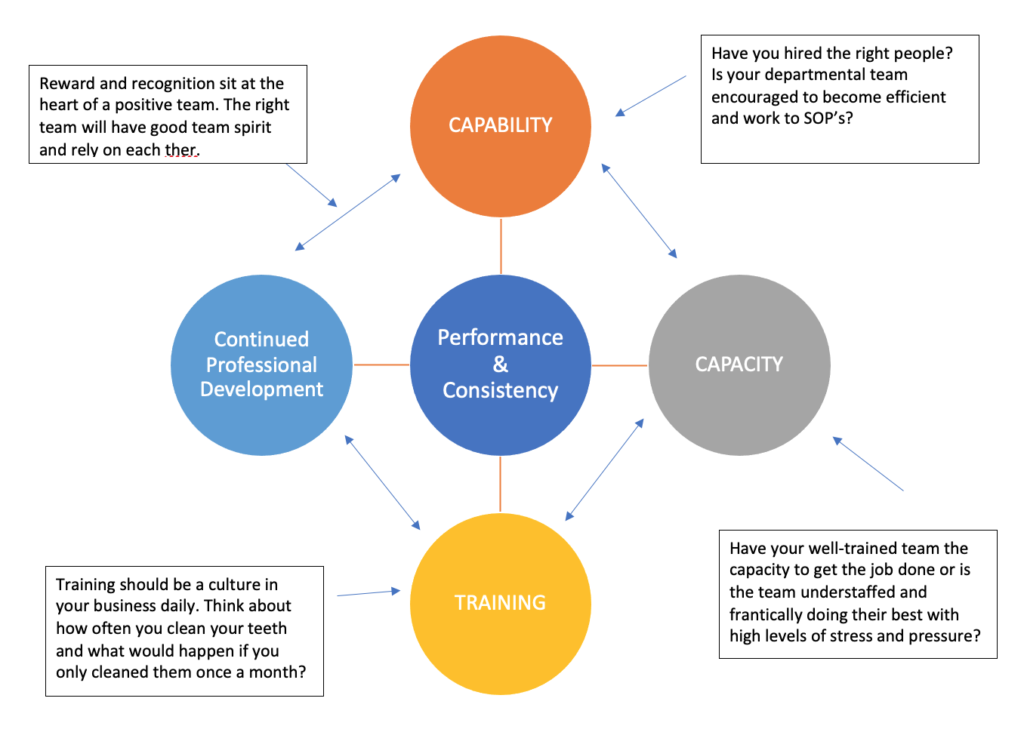Replace the word Train with Nurture!
Training generally within hospitality can be passive at best or non existent beyond information and core skills shared during induction orientation. In hotel companies training programmes can sometimes tick some useful boxes but ultimately these programmes can fall shot on delivering the inspiration to spark the colleague into progressive, ongoing development.
The cost of training can also be seen as an additional expense within a business were FC’s and accountants might not always connected to the benefits of trained colleagues, especially if they have a payroll to revenue % to manage. It’s irrevocably true however that 4 trained waiters will deliver a better job than 7 untrained waiters, which ultimately cost significantly more than training any way.
In assessing your training impact on colleagues and the guest experience (and subsequently your business), key to the right culture is how often training takes place. If you think that training could be compared to brushing your teeth, you wouldn’t brush your teeth just once a month. We focus on micro training sessions daily that creates a solid foundation whilst nurturing a culture of ongoing self improvement. This keeps your team engaged. But why keep your team engaged?
Training ultimately will shape the lifestyle of your colleagues. Gen X need an out game. They need to know where their next holiday is coming from, their next car, affordability of children, a bigger flat or house, and generally more security in life. All of these factors come as a result of recognition and reward and these in turn are mapped to training – what gets measured gets managed. We don’t train, we nurture.
Who does the training?
It’s often an error that training solely becomes the role of an in-house generic trainer as they lack the on-the-job contectual insights to really drive home the training, especially high level skills. Another error is that an apex training leader within the department becomes sole responsible. This can create a vertical height of unachievable ambition and expectation. Our approach is for the senior leader to guide the group development where the team chiefly enjoy the relative freedom of training themselves. In the latter scenario progress comes from within a cohort of equality that lifts the team together in line with the strongest and weakest within the team.
 What is the individual and collective journey?
What is the individual and collective journey?
Most teams within hospitality comprise of the following colleague types. Think of who in your team satisfies the following descriptions?
The aspirational leader who has already enjoyed career and promotional success.
The colleague who is keen to achieve success, promotion and financial reward.
The colleague who has yet to benefit from inspirational training but has great potential.
The colleague who has limited capacity and capability and is just keen for a wage and core job security.
The colleague who won’t make it regardless of training and is part of your churn index.
Each of these character types/individuals all require a separate career journey of achievement and it’s vital that realistic stepping-stone targets are set out within frequent, meaningful appraisals. However, each of the individual targets should also be part of the wider business vision which undoubtedly will involve successional planning.
The difference between train the task and training the detail.
When a new colleague commences their role expectations are driven by the job description. Job descriptions are inherently generic because they focus on what is expected rather than how the role should be delivered. Daily training explores the fine detail to ensure high level performance of skill and knowledge in a multitude of expanding and fluid scenarios. Success breed will ultimately breed success.
Effective training is a game changer when it comes to retaining staff and also for setting the correct culture.
For more information on what a joined up daily training plan looks like get in touch.


